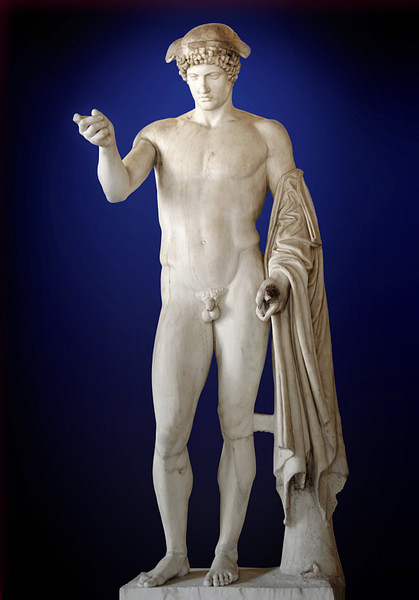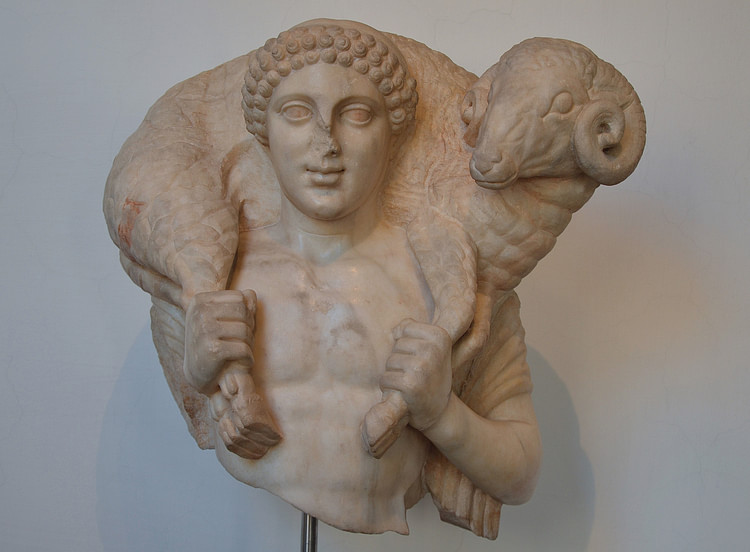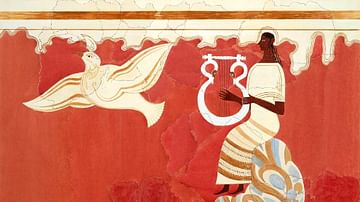
Hermes was the ancient Greek god of trade, wealth, luck, fertility, animal husbandry, sleep, language, thieves, and travel. One of the cleverest and most mischievous of the 12 Olympian gods, Hermes was their herald and messenger. In that position, he came to symbolise the crossing of boundaries in his role as a guide between the two realms of gods and humanity.
Hermes was known for his impish behaviour and curiosity. He invented the lyre, the alphabet, and dice. The latter explains why the god was beloved by gamblers. Hermes was the patron of shepherds and invented the panpipes they used to call their flock. To the Romans, the god was known as Mercury.
Origins & Family
Hermes has a very long history, being mentioned in the Linear B tablets of the Mycenaean civilization, at its height from the 15th to 13th century BCE. Such tablets have been discovered at Pylos, Thebes, and Knossos. With origins, then, as an Arcadian fertility god who had a special love for the Peloponnese, the ancient Greeks believed Hermes was the son of Zeus and the nymph Maia (daughter of the Titan Atlas) and that he was born on Mt. Cyllene in Arcadia. In mythology, Hermes was also the father of the pastoral god Pan and Eudoros (with Polymele), one of the leaders of the Myrmidons, although the god was not given a wife in any Greek myth. The idea that Hermes represented movement is reflected in his role as the leader of both the Nymphs and Graces (Charites).
Hermes & the Gods
Noted for his impish character and constant search for amusement, Hermes was one of the more colourful gods in Greek mythology. While still a baby, he stole his half-brother Apollo's herd of 50 sacred cattle from Pieria, cleverly reversing their hoofmarks by adding bark shoes to make it difficult to follow their tracks. Hermes, therefore, became associated with thieves and he managed to keep the stolen herd of cattle until the satyrs finally discovered it in a cave in Arcadia. After a hearing before Zeus and the Olympian gods, Hermes was permitted to hold on to the herd (now down to 48 as he had already sacrificed two of them) if he gave Apollo his lyre. The episode illustrates the god's link with both physical and moral boundaries and crossing them, and may have a basis in historical events, as here described by the famed expert on Greek mythology Robert Graves:
A tradition of cattle raids made by the crafty Messenians on their neighbours, and of a treaty by which these were discontinued, seems to have been mythologically combined with an account of how the barbarous Hellenes took over and exploited, in the name of their adopted god Apollo, the Creto-Helladic civilizations which they found in Central and Southern Greece. (66)

As messenger and herald, particularly for Zeus, Hermes is involved in many mythological episodes. Perhaps most celebrated was his killing of the many-eyed (some accounts say 100-eyed) monster Argos on the orders of Zeus in order to free Io. Hermes also freed Ares from his year-long imprisonment in a cauldron by the twin Giants Otus and Ephialtes. One of his most famous regular roles was as a leader of souls to the river Styx in the underworld, where the boatman Charon would take them to Hades. Hermes was also known as something of a trickster, stealing at one time or another Poseidon's trident, Artemis' arrows, and Aphrodite's girdle.
Hermes & the Heroes
Hermes figures in the Trojan War of the Mycenaean period, as told by Homer in the Iliad. Although in one lengthy passage he acts as counsellor and guide to the Trojan King Priam in his attempt to reclaim the body of his fallen son Hector, Hermes actually supports the Achaeans in the Trojan War. The god is most often described by Homer as 'Hermes the guide, slayer of Argos' and 'Hermes the kindly'. Hermes gives particular help to Odysseus, especially on his long return voyage to Ithaca (as told in Homer's Odyssey), for example, giving him an antidote to the spells of Circe. Another hero helped by the god was Perseus, Hermes giving him an unbreakable sword or sickle (harpe) of adamantine and guiding him to the three Graeae who would reveal the location of Medusa.
What did Hermes Invent?
Hermes was credited with inventing fire, the alphabet, dice (actually knucklebones) - and so he was worshipped by gamblers in his capacity as god of luck and wealth, and musical instruments, in particular, the lyre - made from a tortoiseshell by the god. Hermes was regarded as the patron of thieves and shepherds thanks to his invention of the pan pipes (syrinx). He was the patron of travellers, and stone pillars (hermae) with a phallus symbol were often to be seen set up along roadsides to act as guides and offer good fortune to those who passed. Hermae were particularly set up at boundaries, reminding of the god's role as a messenger between the gods and humanity, as well as his function as a guide for the dead into the next life. In addition, Hermes was regarded as the patron of the home, and people often built small marble stelai in front of their doors in his honour.

Famous for his diplomatic skills, he was also regarded as the patron of languages and rhetoric. Orators regarded the god who transferred words from sender to receiver as their patron, as did interpreters (another group of boundary-crossers) and, even today, the study and interpretation of texts carries his name: hermeneutics. In the Hellenistic period, the god was often associated with gymnasia and seen as the protector of youths. Finally, the god's Latin name, Mercury, is, of course, the name of a planet, naturally, the fastest one to orbit the sun.
Cults Dedicated to Hermes
Hermes was honoured just about everywhere in ancient Greece but especially in the Peloponnese at Mt. Cyllene and such city-states as Megalopolis, Corinth and Argos. Athens had one of the oldest cults to the god where the Hermaia festival for young boys was held annually. Delos, Tanagra, and the Cyclades were other places where Hermes was especially popular. Finally, the god had a noted sanctuary on Crete at Kato Symi where young men about to become full citizens engaged in a two-month-long rite where they spent time cultivating homosexual relations with older men in the mountains thereabouts. Another Hermaia festival on Crete permitted slaves to temporarily take the part of their masters. Once again, Hermes' association with crossing boundaries of all kinds is evident here.

How is Hermes Represented in Art?
In ancient Greek Archaic and Classical art, Hermes is depicted holding the kerykeion or caduceus staff (signifying his role as a herald, the stick is either cleft or with an open figure of 8 at the top), wearing winged sandals (symbolic of his role as a messenger), a long tunic or leopard skin, sometimes also a winged cap (petasos), and occasionally with a lyre. He may also carry a ram in a nod to his role as patron of shepherds, especially in Boeotian and Arcadian art. In his association with youths, the god was often portrayed as abeardless youth holding the infant Hercules or Achilles. At the same time, his association with trade is evidenced in the seals of Delos where he carries a purse. Perhaps the most celebrated depiction of Hermes in Greek art is the magnificent statue by Praxiteles (c. 330 BCE) which once stood in the temple of Hera at Olympia and now resides in the archaeological museum of the site.





